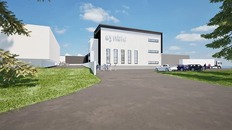- Supported by a €2.99 million Finnish government grant, Synbio Powerlabs is transforming a facility near Helsinki.
- The new facility, operational by early 2025, will feature 6x250,000L manufacturing vessels.
- Ivy Farm will first demonstrate scalability of mammalian cells in food-grade vessels.
- The partnership aims to scale up to 10,000L fermenters, enhancing production efficiency.

Partnership Announcement
Synbio Powerlabs Oy and Ivy Farm Technologies Ltd. have announced a new partnership to scale and produce cultivated meat using mammalian cells in large food-grade fermenters at Synbio’s new facility near Helsinki.
Government Support and Facility Details
With a €2.99 million grant from the Finnish government, Synbio Powerlabs is converting a large food-grade facility into a multi-purpose hub for food innovation. The facility, set to go live in early 2025, will feature pilot scale equipment and production scales at 10,000L and 27,000L, along with 6x250,000L manufacturing vessels, making it the largest of its kind globally.
Strategic Advantages
Ivy Farm will be the first to demonstrate the scalability of mammalian cells in these food-grade vessels. This partnership allows Ivy Farm to mitigate capex costs and risks associated with scaling up production by leveraging Synbio Powerlabs' expertise and facilities. The initial focus will be on tech transfer and scaling up to 10,000L fermenters, with plans to further enhance production scales and efficiencies.
First Cultivated Beef Tasting in the Nordics
The partnership was announced at Iceland Innovation Week, where Ivy Farm co-hosted the first ever tasting of cultivated beef in the Nordics with ORF Genetics. The event showcased Ivy Farm’s cultivated premium Angus beef, attended by Icelandic government officials and other food innovators.
Regional Potential
The Nordic region is seen as promising for cultivated meat, with forward-thinking consumers and regulators aiming to streamline approvals to boost food security and economic potential. Similar to regions like the Middle East, the Nordics are high net-importers of meat but have abundant renewable energy and tech expertise to capitalize on cultivated meat opportunities.

